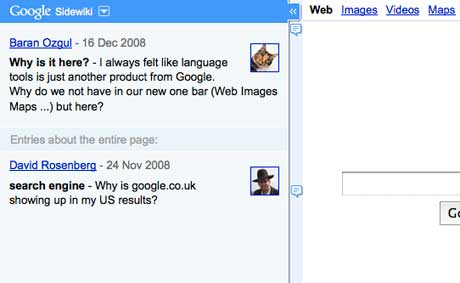Yesterday Google launched a service called Sidewiki.
I’m a sucker for anything new, so before I’d read more than a couple of sentences on the topic, I was downloading the Google browser toolbar with Sidewiki integrated into it. The add-on toolbar is available for Firefox 2+ or Internet Explorer 6+ and it will soon become a feature of Google’s own browser, Chrome (and, I hope, the nascent Chromium for Mac).
So what’s the concept?
Google Sidewiki – an introduction
Essentially, Sidewiki is a system that allows you to comment on any web page. The idea, according to Google, is for readers to contribute “insights” and “helpful information” to any page. All you do is press the Sidewiki icon in your browser toolbar, and then you can leave your thoughts on any page. For example, one of my first actions was to give the team here at Coast some well-deserved praise. Visiting www.elixirrdigital.com I typed in the following:

In an ideal world, the Sidewiki would be used for relevant, intelligent discussion of the page in question. But I have doubts that this will even be the norm. Visiting the Google UK home page, I found that the discussion so far didn’t add anything to my experience.

Similarly, a spammer had got in on the act early over at econsultancy.

Will people warm to Sidewiki?
This is the question that is all important, and – I think – too early to answer. There are, as I write, no Sidewikis on the home pages of technology sites such as The Register or the Guardian’s technology pages – and a paltry two Sidewiki comments on the blog of Google’s Matt Cutts. Most of the stories I’ve so far read about Sidewikis don’t have Sidewikis themselves (apart from the one I added to The Telegraph).
So, a day in, things are looking slow. Only if Sidewiki gets popular will its joys and flaws become properly apparent.
Sidewiki pros and cons
That said, there are pros and cons that you can already detect. The best thing I’ve seen so far is the facility for site owners to add a sticky post at the top of the Sidewiki. As long as your site is registered with Google Webmaster Tools, and you are logged into your Google account, you are recognised as the site owner – and your comment goes to the top. Great for adding another welcome or plug for your services.
I can also see that backlinks in Sidewiki have SEO potential, though I plan talk to some of the team here to see what they think. Will these links actually have much value? I just don’t know.
On the other hand, my worries are these:
- Taking conversation off-page. I like to decide whether there is conversation on one of my web pages. And I don’t like the idea of people commenting on, say, my blog posts in Sidewiki instead of the comments thread on my own page. It takes value from my sites.
- Privacy. I quite like the ability to see Sidewikis on pages I’m browsing, but to do so I have to use Google’s toolbar. I am not comfortable with it recording details of the sites I visit. In my own Google account, I always switch on private browsing, and I’m suspicious of the information gathered by the toolbar.
- Spamming. Enough said.
- Reputation management nightmare. Some industries are incredibly competitive and cut-throat, and I can see huge reputation management issues coming to light. For example, restaurants already have to contend with good and bad reviews on external sites, but to have poor reviews (potentially posted by competitors) in a browser sidebar alongside their own sites will be difficult to contend with. Personally, I’d rather eat in a restaurant where the owner manages the kitchen, rather than one in which they spend their time trying to bump Sidewiki comments down the page.
Of course, Sidewiki may well fizzle out in a week. Comments please, and preferably at the foot of this page…
